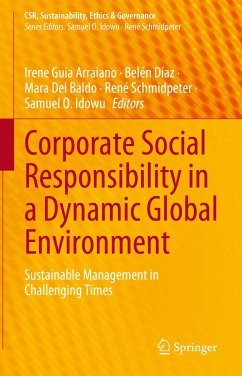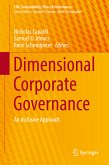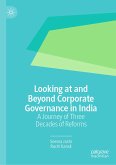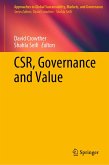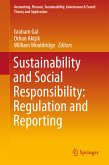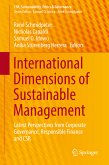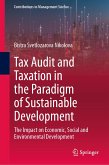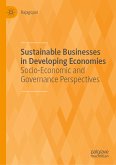Corporate Social Responsibility in a Dynamic Global Environment (eBook, PDF)
Sustainable Management in Challenging Times
Redaktion: Arraiano, Irene Guia; Idowu, Samuel O.; Schmidpeter, René; Del Baldo, Mara; Díaz, Belén


Alle Infos zum eBook verschenken

Corporate Social Responsibility in a Dynamic Global Environment (eBook, PDF)
Sustainable Management in Challenging Times
Redaktion: Arraiano, Irene Guia; Idowu, Samuel O.; Schmidpeter, René; Del Baldo, Mara; Díaz, Belén
- Format: PDF
- Merkliste
- Auf die Merkliste
- Bewerten Bewerten
- Teilen
- Produkt teilen
- Produkterinnerung
- Produkterinnerung

Hier können Sie sich einloggen

Bitte loggen Sie sich zunächst in Ihr Kundenkonto ein oder registrieren Sie sich bei bücher.de, um das eBook-Abo tolino select nutzen zu können.
This book highlights the latest research on responsible business and its practical implications for the economy, society, academia, and politics. It presents selected contributions from respected scholars and experts who have conducted international research on corporate social responsibility, sustainability, ethics, corporate governance, finance, and responsible investing.
The book examines the spreading and enhancement of CSR and sustainability at the micro, meso, and macro levels, especially in light of their increased relevance following the recent pandemic.
Taken together, the…mehr
- Geräte: PC
- ohne Kopierschutz
- eBook Hilfe
- Größe: 9.49MB
![Dimensional Corporate Governance (eBook, PDF) Dimensional Corporate Governance (eBook, PDF)]() Dimensional Corporate Governance (eBook, PDF)81,95 €
Dimensional Corporate Governance (eBook, PDF)81,95 €![Looking at and Beyond Corporate Governance in India (eBook, PDF) Looking at and Beyond Corporate Governance in India (eBook, PDF)]() Seema JoshiLooking at and Beyond Corporate Governance in India (eBook, PDF)105,95 €
Seema JoshiLooking at and Beyond Corporate Governance in India (eBook, PDF)105,95 €![CSR, Governance and Value (eBook, PDF) CSR, Governance and Value (eBook, PDF)]() CSR, Governance and Value (eBook, PDF)137,95 €
CSR, Governance and Value (eBook, PDF)137,95 €![Sustainability and Social Responsibility: Regulation and Reporting (eBook, PDF) Sustainability and Social Responsibility: Regulation and Reporting (eBook, PDF)]() Sustainability and Social Responsibility: Regulation and Reporting (eBook, PDF)161,95 €
Sustainability and Social Responsibility: Regulation and Reporting (eBook, PDF)161,95 €![International Dimensions of Sustainable Management (eBook, PDF) International Dimensions of Sustainable Management (eBook, PDF)]() International Dimensions of Sustainable Management (eBook, PDF)121,95 €
International Dimensions of Sustainable Management (eBook, PDF)121,95 €![Tax Audit and Taxation in the Paradigm of Sustainable Development (eBook, PDF) Tax Audit and Taxation in the Paradigm of Sustainable Development (eBook, PDF)]() Bistra Svetlozarova NikolovaTax Audit and Taxation in the Paradigm of Sustainable Development (eBook, PDF)113,95 €
Bistra Svetlozarova NikolovaTax Audit and Taxation in the Paradigm of Sustainable Development (eBook, PDF)113,95 €![Sustainable Businesses in Developing Economies (eBook, PDF) Sustainable Businesses in Developing Economies (eBook, PDF)]() RajagopalSustainable Businesses in Developing Economies (eBook, PDF)97,95 €
RajagopalSustainable Businesses in Developing Economies (eBook, PDF)97,95 €-
-
-
The book examines the spreading and enhancement of CSR and sustainability at the micro, meso, and macro levels, especially in light of their increased relevance following the recent pandemic.
Taken together, the results of the empirically and theoretically based contributions offer a unique and multi-faceted perspective on current global trends and expected developments in this area. They cover a wide range of contexts and situations, helping readers expand their knowledge and drive effective change to tap their organizations' full potential.
Dieser Download kann aus rechtlichen Gründen nur mit Rechnungsadresse in A, B, BG, CY, CZ, D, DK, EW, E, FIN, F, GR, HR, H, IRL, I, LT, L, LR, M, NL, PL, P, R, S, SLO, SK ausgeliefert werden.
- Produktdetails
- Verlag: Springer Nature Switzerland
- Seitenzahl: 405
- Erscheinungstermin: 20. April 2023
- Englisch
- ISBN-13: 9783031246470
- Artikelnr.: 67815641
- Verlag: Springer Nature Switzerland
- Seitenzahl: 405
- Erscheinungstermin: 20. April 2023
- Englisch
- ISBN-13: 9783031246470
- Artikelnr.: 67815641
- Herstellerkennzeichnung Die Herstellerinformationen sind derzeit nicht verfügbar.
